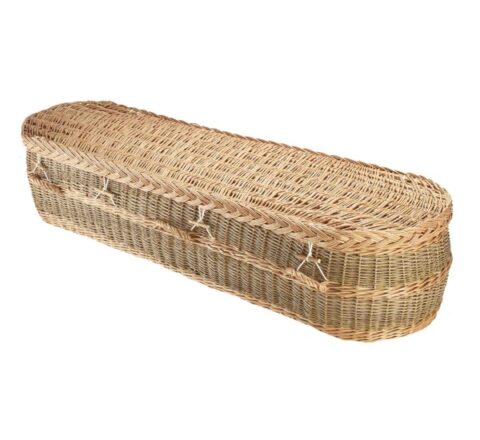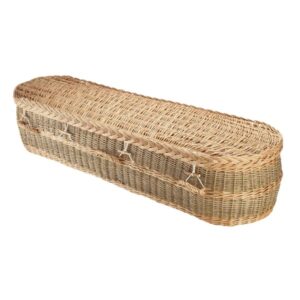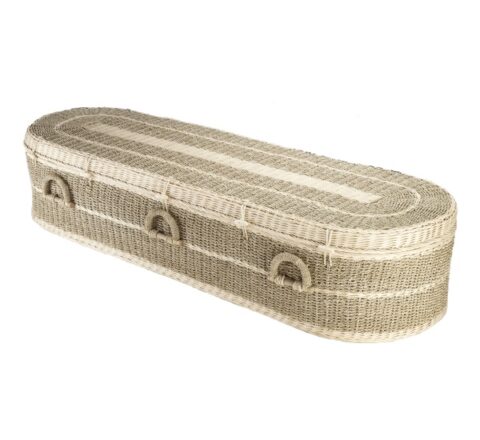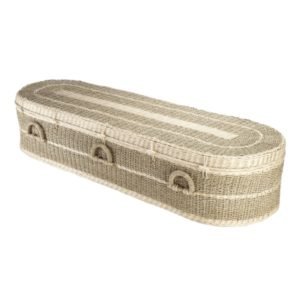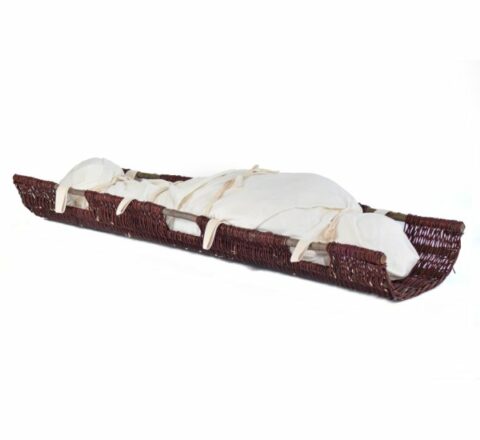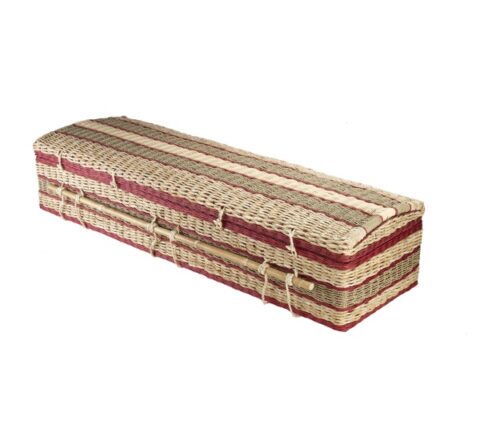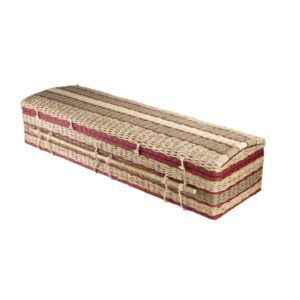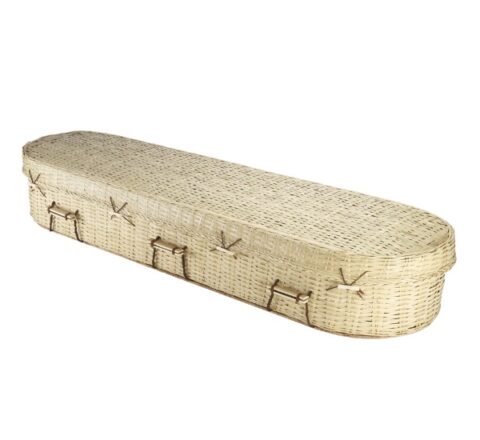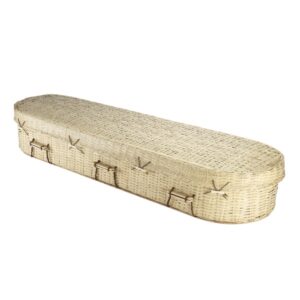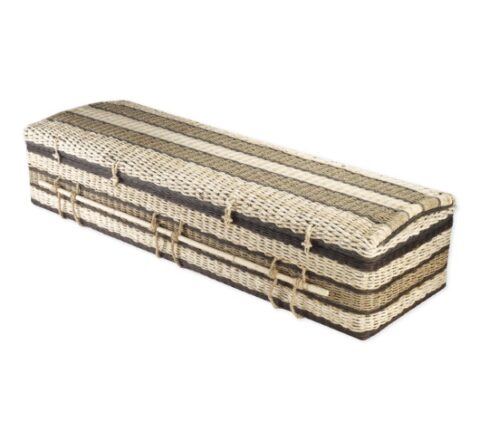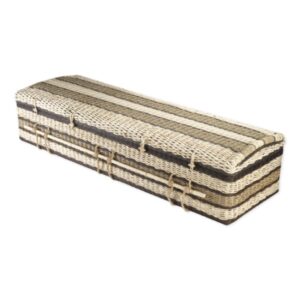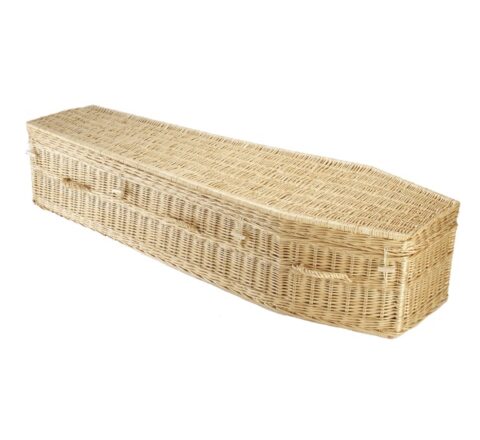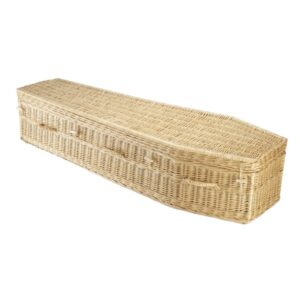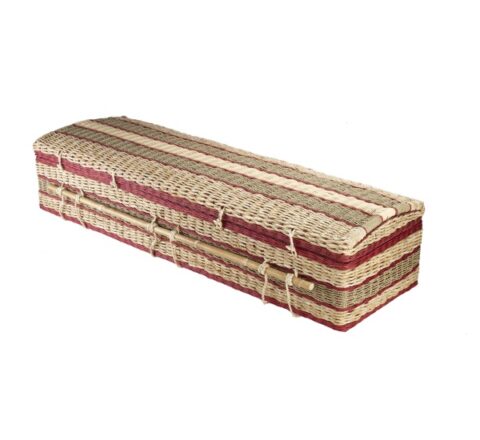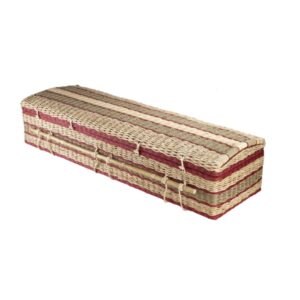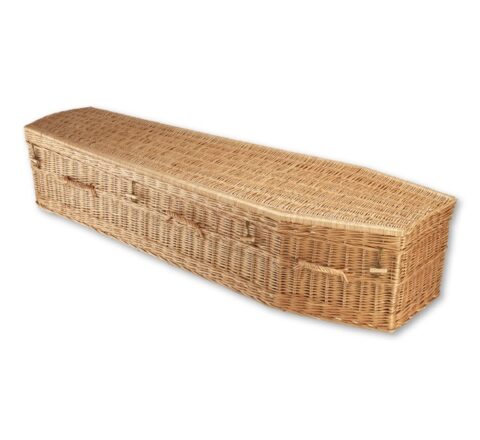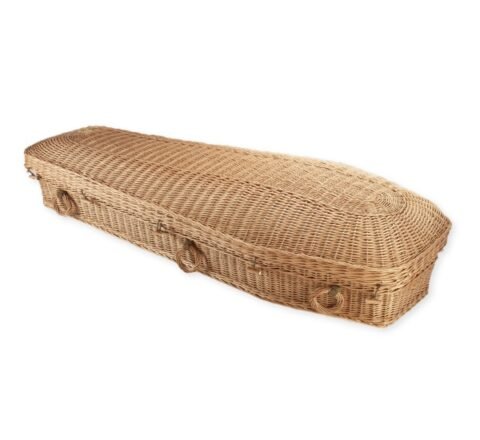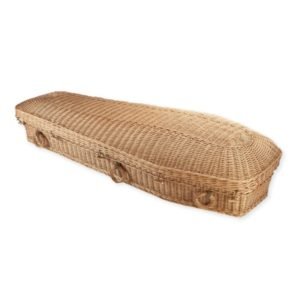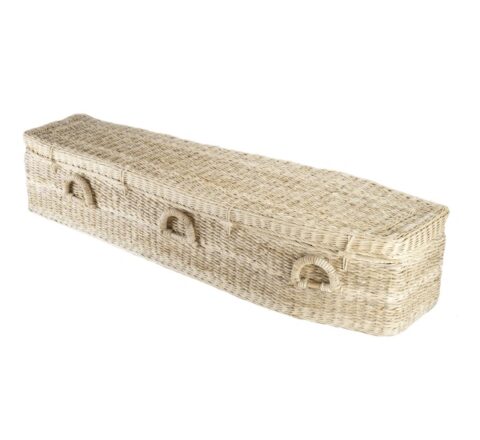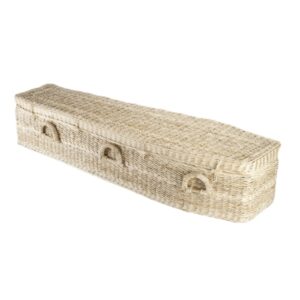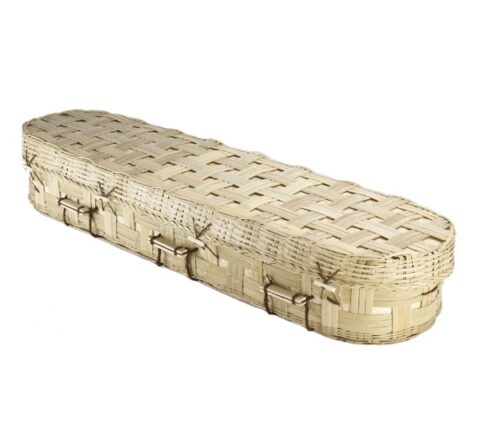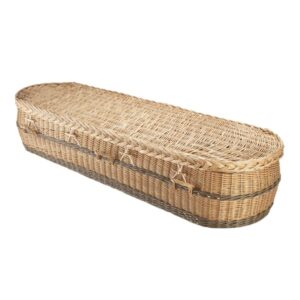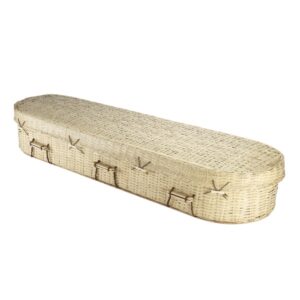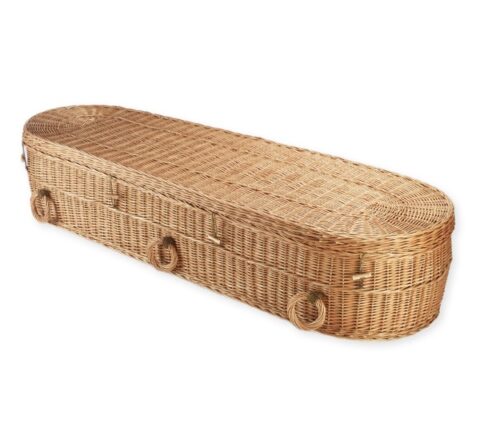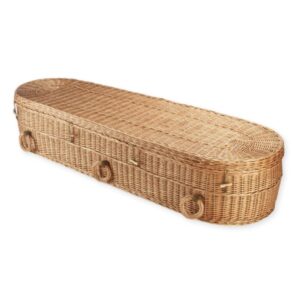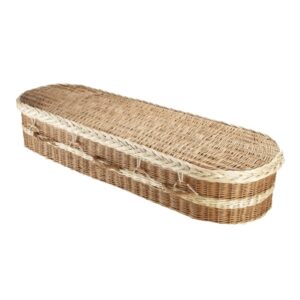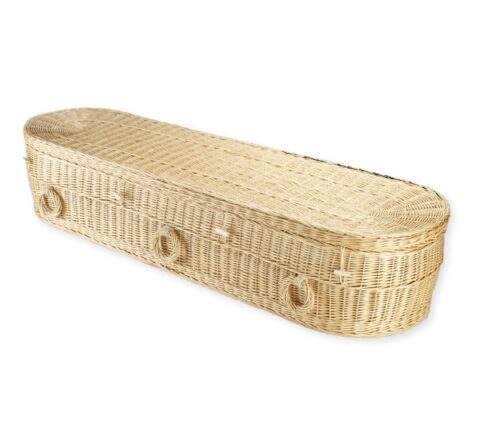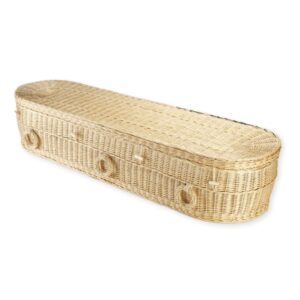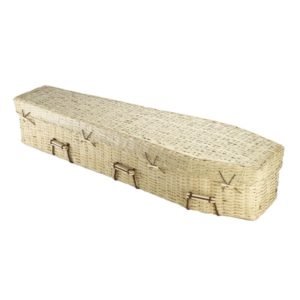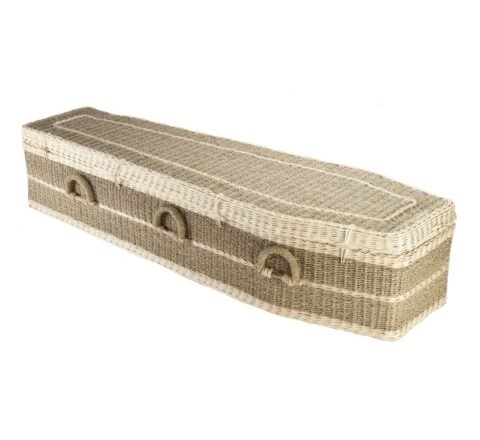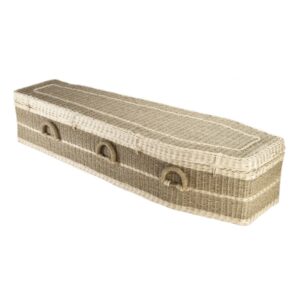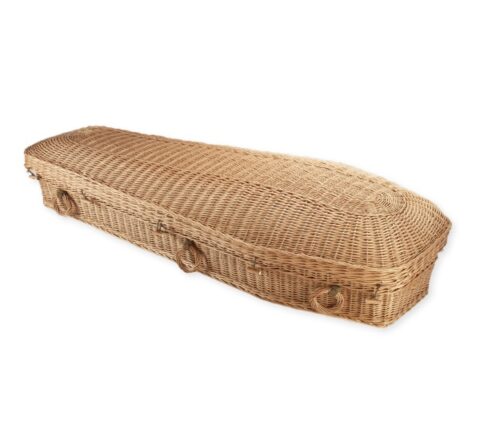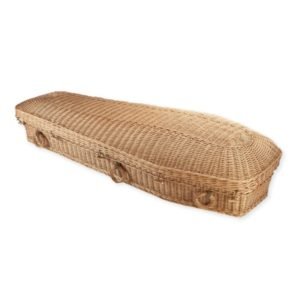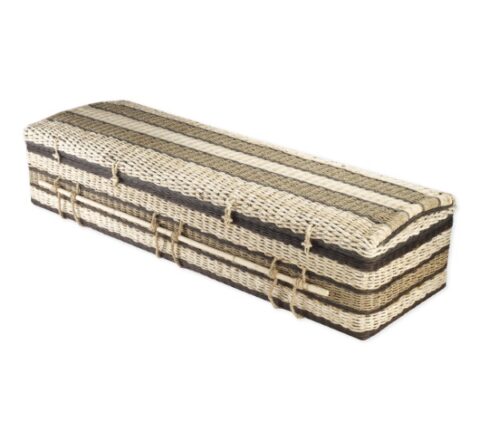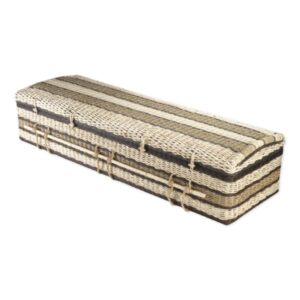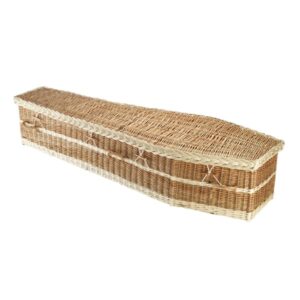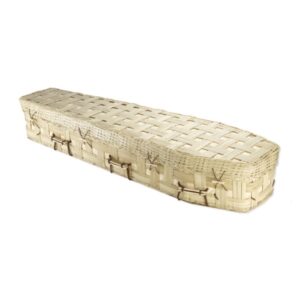Woven Bamboo coffins are popular with environmentalists
Over the 25 years it spent negotiating to join the global trade body, China has rushed to transform itself into a modern economy, with glittering high rise cities and shopping malls crammed with Western goods.
Old court-yard style houses have been demolished to make way for high rises. And furniture firms B&Q and Ikea are doing brisk business in styling the homes of the fashion-conscious younger Chinese.
As for traditional bamboo furniture, you’d be hard-pressed to give it away. But as China goes modern, interest in Chinese tradition has mushroomed in the West.
But one man has taken his fascination with environmentally-friendly crafts to the grave. William Wainman designs, makes and exports bamboo Bamboo eco-coffins, and these are available direct to the Public through Comparethecoffin.com
He began by devising a new process for treating bamboo in order to start a furniture-making business, which exports to Europe and the United States. But woven coffins have doubled his sales in little more than a year, impressive for a product that doesn’t attract repeat customers.
Choose From The Range Of Natural Material Coffins
-
Quick View£785.00
This English Willow coffin is made from English Willow grown on the Somerset Levels. The willow is a deciduous tree found primarily on moist soil in cold and temperate regions. Almost all willows take root very readily from cuttings or where broken branches lie on the ground. Made by one of the UK’s oldest manufacturers of willow coffins using 100% natural materials. Includes cotton liner, headrest and name plate.
-
Quick View£555.00
The Pandanus Rounded coffin is made from Pandanus. Pandanus or wild pineapple is an environmentally friendly alternative to seagrass, a plant which grows in the coastal waters of East Africa, Southeast Asia and the Caribbean. Pandanus, it grows rapidly on land even in adverse conditions. When woven it is almost indistinguishable from seagrass. Produced in a Fair Trade company in Indonesia. Made from 100% natural materials. Includes cotton liner, headrest and name plate.Price shown includes Packaging, Delivery and VAT
-
Quick View£525.00
NEW TO COMPARETHECOFFIN.COM
This beautifully made Shroud and Willow stretcher is a real alternative to a traditional coffin
The willow is a deciduous tree found primarily on moist soil in cold and temperate regions. Almost all willows take root very readily from cuttings or where broken branches lie on the ground. Made by a co-operative of cottage industries in Poland using 100% natural materials. Includes cotton liner, headrest and name plate.
-
Quick View£630.00
Click on picture of coffin to enlarge image. To view this page as a separate tab click here so it can be individually shared. To read more about Banana Coffins click here
-
Quick View£545.00
Click on picture of coffin to enlarge image. To view this page as a separate tab click here so it can be individually shared. To read more about Banana Coffins click here
-
Quick View£635.00
This domed lid coffin casket is built around a rattan frame with alternate bands of woven banana, pandanus (wild pineapple) and rattan. These caskets are made in a Fair Trade company in Indonesia and are 100% biodegradable.Please notify us if you require an engraved name plate to be added to the outside of the coffin.
-
Quick View£565.00
This beautifully made Willow traditional Wicker coffin, using a lighter Natural colour material. The willow is a deciduous tree found primarily on moist soil in cold and temperate regions. Almost all willows take root very readily from cuttings or where broken branches lie on the ground. Made by a co-operative of cottage industries in Poland using 100% natural materials. Includes cotton liner and name plate.
-
Quick View£595.00
This domed lid coffin casket is built around a rattan frame with alternate bands of woven banana, pandanus (wild pineapple) and rattan. These caskets are made in a Fair Trade company in Indonesia and are 100% biodegradable.
-
Quick View£565.00
This beautifully made Willow traditional Wicker Coffin. The willow is a deciduous tree found primarily on moist soil in cold and temperate regions. Almost all willows take root very readily from cuttings or where broken branches lie on the ground. Made by a co-operative of cottage industries in Poland using 100% natural materials. Includes cotton liner and name plate.
-
Quick View£585.00
The Willow Pod Coffin is a beautifully curved and uniquely shaped coffin, using a lighter Natural colour material. The willow is a deciduous tree found primarily on moist soil in cold and temperate regions. Almost all willows take root very readily from cuttings or where broken branches lie on the ground. Made by a co-operative of cottage industries in Poland using 100% natural materials. Includes cotton liner, headrest and name plate.
-
Quick View£555.00
Click on picture of coffin to enlarge image. To view this page as a separate tab click here so it can be individually shared. To read more about Banana Coffins click here
-
Quick View£525.00
The Bamboo Lattice Rounded coffin is constructed of two layers of woven bamboo to give it its distinctive pattern. It is similar to the Bamboo Lattice Traditional coffin with rounded ends. Bamboo comes from a group of perennial evergreen plants in the grass family, and is the fastest growing plant in the world. Produced in a UK owned Fair Trade company in China. Made from 100% natural materials. Includes cotton liner, headrest and name plate.
-
Quick View£750.00
This English Willow coffin is made from English Willow grown on the Somerset Levels. The willow is a deciduous tree found primarily on moist soil in cold and temperate regions. Almost all willows take root very readily from cuttings or where broken branches lie on the ground. Made by one of the UK’s oldest manufacturers of willow goods using 100% natural materials. Includes cotton liner, headrest and name plate.
-
Quick View£455.00
The Bamboo Rounded Coffin is similar to the traditional but with rounded ends. Bamboo comes from a group of perennial evergreen plants in the grass family, and is the fastest growing plant in the world. Produced in a UK owned Fair Trade company in China. Made from 100% natural materials. Includes cotton liner and name plate.
-
Quick View£785.00
This English Wicker coffin is made from English Willow grown on the Somerset Levels. The willow is a deciduous tree found primarily on moist soil in cold and temperate regions. Almost all willows take root very readily from cuttings or where broken branches lie on the ground. Made by one of the UK’s oldest manufacturers of willow goods using 100% natural materials. Includes cotton liner, headrest and name plate.
-
Quick View£565.00
This beautifully made Willow Rounded coffin is a similar to the Willow traditional but with rounded ends. The willow is a deciduous tree found primarily on moist soil in cold and temperate regions. Almost all willows take root very readily from cuttings or where broken branches lie on the ground. Made by a co-operative of cottage industries in Poland using 100% natural materials. Includes cotton liner, headrest and name plate.
-
Quick View£785.00
This English Wicker coffin is made from English Willow grown on the Somerset Levels. The willow is a deciduous tree found primarily on moist soil in cold and temperate regions. Almost all willows take root very readily from cuttings or where broken branches lie on the ground. Made by one of the UK’s oldest manufacturers of willow coffins using 100% natural materials. Includes cotton liner, headrest and name plate.
-
Quick View£565.00
This beautifully made Wicker Willow Rounded coffin is a similar to the Willow traditional but with rounded ends, using a lighter Natural colour material. The willow is a deciduous tree found primarily on moist soil in cold and temperate regions. Almost all willows take root very readily from cuttings or where broken branches lie on the ground. Made by a co-operative of cottage industries in Poland using 100% natural materials. Includes cotton liner, headrest and name plate.
-
Quick View£455.00
The Bamboo Traditional is a traditionally shaped Coffin. Bamboo comes from a group of perennial evergreen plants in the grass family, and is the fastest growing plant in the world. Produced in a UK owned Fair Trade company in China. Made from 100% natural materials. Includes cotton liner, head rest and name plate.
-
Quick View£785.00
This English Wicker coffin is made from English Willow grown on the Somerset Levels. The willow is a deciduous tree found primarily on moist soil in cold and temperate regions. Almost all willows take root very readily from cuttings or where broken branches lie on the ground. Made by one of the UK’s oldest manufacturers of willow coffins using 100% natural materials. Includes cotton liner, headrest and name plate.
-
Quick View£555.00
The Pandanus Traditional coffin is made from Pandanus. Pandanus or wild pineapple is an environmentally friendly alternative to seagrass, a plant which grows in the coastal waters of East Africa, Southeast Asia and the Caribbean. Pandanus, it grows rapidly on land even in adverse conditions. When woven it is almost indistinguishable from seagrass. Produced in a Fair Trade company in Indonesia. Made from 100% natural materials. Includes cotton liner and name plate.Price shown includes Packaging, Delivery and VAT
-
Quick View£585.00
This popular Pine and Bamboo Casket is made from a pine frame and is covered with slats of bamboo, grown in government licensed plantations close to our factory Produced in a UK owned Fair Trade company in China. Made from 100% natural materials. Includes cotton liner, headrest and name plate.
-
Quick View£655.00
This domed lid coffin casket is built around a rattan frame with alternate bands of woven banana, pandanus (wild pineapple) and rattan. These caskets are made in a Fair Trade company in Indonesia and are 100% biodegradable.Please notify us if you require a name and message to be added to the outside of the coffin…
-
Quick View£815.00
This English Wicker coffin is made from English Willow grown on the Somerset Levels. The willow is a deciduous tree found primarily on moist soil in cold and temperate regions. Almost all willows take root very readily from cuttings or where broken branches lie on the ground. Made by one of the UK’s oldest manufacturers of willow coffins using 100% natural materials. Includes cotton liner, headrest and name plate.
-
Quick View£525.00
The Bamboo Lattice Traditional coffin is constructed of two layers of woven bamboo to give it its distinctive pattern. Bamboo comes from a group of perennial evergreen plants in the grass family, and is the fastest growing plant in the world. Produced in a UK owned Fair Trade company in China. Made from 100% natural materials. Includes cotton liner, headrest and name plate.
Green Funeral
 “The great thing about the coffin business is it’s been a question of the market coming to us, but with the furniture it was always a question of us saying ‘We’ve got this, do you want it?’.”
“The great thing about the coffin business is it’s been a question of the market coming to us, but with the furniture it was always a question of us saying ‘We’ve got this, do you want it?’.”
The coffins got an unexpected advertising boost last summer when Nicholas Albery, a prominent environmentalist campaigner, was buried in one after being killed in a car crash.
Mr Albery was the founder of the Natural Death Centre, which promotes burials in woodland rather than cemeteries and “inexpensive, green, family-organised funerals”.
Mr Wainman set up his small factory in the central Chinese province of Hunan about seven years ago after becoming fascinated by bamboo during a year spent teaching English in the small city of Changde.
“I had an idea in my mind that it was a fairly environmentally beneficial material – in fact, it’s even better than I’d imagined it could be,” he says.
Bamboo never needs replanting, it grows back rapidly after being cut – up to a metre a day for some species. It is strong, pliable, with greater tensile strength than steel, and produces more oxygen than any other plant for its size to weight ratio, he enthuses.
But his environmentalist beliefs were not the only reason Mr Wainman wanted to start a business in Hunan. He had fallen in love with Zhang Weimin, now his wife.
“I wanted to go back to the same sort of area but I found the only way I could do that was to create my own employment – the only international companies were all in Beijing and Hong Kong.”
Changde is a poor place – a farming area where the average income is about 500 yuan a month ($60; £42).
Local officials welcomed his plans, but that did nothing to lower the bureaucratic hurdles to starting a company. And China’s WTO entry is unlikely to reduce the number of regulations.
“They still had numerous rules and regulations to follow to the letter, and to make sure that I followed to the letter,” he says.
It took three months to collect half a dozen company licences from different government departments, while his UK company licence took just 24 hours.
Weiming Furniture – named in honour of his father-in-law, who is now his export manager – employs about 35 staff in China, has a small office in Britain and annual sales of just under £100,000 ($145,000). Coffins account for more than half of that.
Weiming’s workers are mostly part-time subsistence farmers aged over 50. Just like elsewhere in rural China, younger people prefer to seek a more prosperous life in the urban fast-lane.
China’s low wages have been a major attraction for manufacturers, building its reputation as a cheap assembly point for consumer goods. Subcontracting work among small rural factories can be cheapest of all. But Mr Wainman is anxious not to be seen as a low-wage employer.
The next stage in his business plan involves the sort of workers co-operative which is increasingly rare in China’s drive towards a market economy.
The biggest obstacle to his profit-sharing scheme is his local Chinese partner: “I think he will come along…it’s just a question of explaining everything very carefully to him.” The coffins are cheaper than more conventional caskets – so he is confident they have a wider market.
He expects China’s entry into the World Trade Organisation to change little for him.
“Hopefully our type of goods is not one that would be involved in a tariff war. That’s one advantage of being quite small and in a niche market”.
Bamboo has nothing but a positive reputation when it comes to the environment. It grows quickly, it doesn’t need pesticides or much water, it pulls carbon dioxide out of the air, and it can be used in a nearly unimaginable range of products. With its well deserved, eco-friendly reputation, companies have been quick to integrate bamboo into product lines and new bamboo-based businesses continue to pop up.
There are now bamboo shirts, skirts, socks, underwear, furniture, floors, paper, plates, sheets, towels, plates, bowls, spoons, kitchen utensils, keyboards, cleaning wipes and of course coffins…practically enough items to outfit an entire house made with bamboo everything.
Method, the San Francisco-based cleaning-products company, uses bamboo for cleaning wipes, aroma rings as well as some of its packaging. And Totally Bamboo, a southern California-based company, sells more than 300 different bamboo-based products.
But with great demand comes the need for great supply. As more and more companies look to source products using bamboo, unsustainable harvesting methods may end up killing a resource that has so much potential.
One downside of bamboo’s popularity is that it’s at risk from overharvesting: The United Nations warns that about half of the 1,200 varieties of bamboo in the world are extinct or in danger of being eradicated.
Enter BooShoot Gardens, a plant tissue culture laboratory out of Mount Vernon, Wash., that is growing large amounts of specific types of bamboo to replenish and increase the world’s bamboo supply and meet the demand from companies like Method and Totally Bamboo.
Founded in 1998 by Jackie Heinricher, BooShoot produced 2,000 bamboo plants in 2004, the first year it released plants. This year it plans to produce more than 2 million, and has the capacity to produce 12 million.
The company sells its bamboo through wholesale growers and retailers in more than 20 states and Canada. It’s been selling bamboo to a biofuel company in the southeast U.S., projects in South Africa and throughout Southeast Asia.
What’s Driving the Bamboo Market
Bamboo has such a green reputation because it grows fast (earning it the moniker of a “rapidly renewable” resource as opposed to a plain old “renewable” resource, a title given to everything from trees to corn to chicken feathers), doesn’t require pesticides, uses little water, and pulls carbon dioxide out of the air faster and better than other plants.
Bamboo plants sequester four times as much carbon dioxide as hardwood trees (taking in 62 tons of CO2 per 2.4 acres versus 16 tons per 2.4 acres of trees) and puts out 35 percent more oxygen.
While bamboo has been recognized for quite a while as a green material, its use has shot up in the last few years along with many other green materials. Bamboo goods are proliferating at major mainstream retailers like Wal-Mart and Target, and being used in clothing both from eco-centric companies and more mainstream ones like JCPenney and Banana Republic.
The bamboo goods industry is expected to be worth $25 billion around 2012, Heinricher said, and some companies that make or are looking into making bamboo goods are encountering a supply bottleneck.
While this demand is boosting BooShoot’s business, it’s having a handful of negative effects on the global bamboo supply. As demand has increased and supply tightened, the final products have been affected. Bamboo flooring, for example, is generally much thinner these days than years ago, Heinricher said.
And then there’s the rate of harvesting: Bamboo can be harvested every 5-10 years, much faster than trees used for other forest-based products. But harvesting is starting to outpace bamboo growth and its ability to recover. Cutting down too much bamboo in one area can damage an even-wider stretch of the plant.
If more than 30 percent (of an acre) is taken at any one time, it begins to affect the viability of the root system and begins to compromise bamboo’s ability to replenish itself.
Natural Material
In recent years the has been a trend to move to more sustainable and natural material for coffins. They often have a softer look and feel and have no ‘hard edges’ or corners and our coffins have no metal fixing and often ties and fixing are made with the materials itself.
The products that we don’t make in the UK are either manufactured by co-operative associations or are covered by a fair trade agre ements ensuring that all workers and suppliers are treated fairly and work in good and safe conditions.
In line with our strong green beliefs, all of our products are manufactured in the most environm entally friendly way. Our products are hand made from locally materials grown and cropped in licensed p lantations.
English Willow Coffin
The English Willow has been grown in England on the Somerset Levels for many centuries and has the ability to regenerate repeatedly from the same “crown” of the plant for up to 40 years. Willow colour variations are achieved naturally by drying, boiling or stripping the bark.
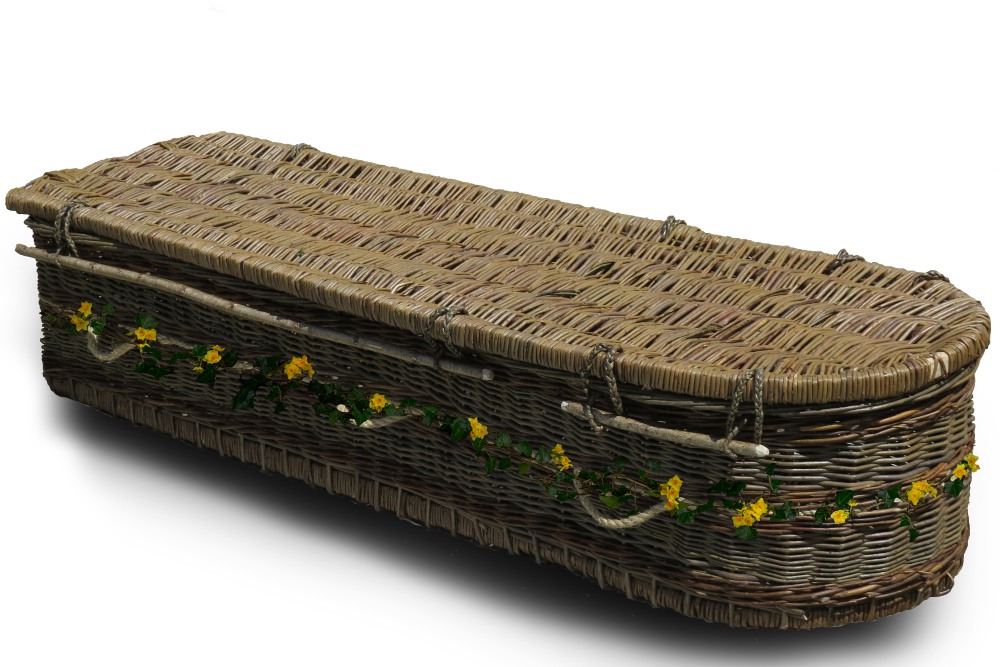
Bamboo Coffin
Bamboo is the fastest growing plant on the planet, growing up to a metre per day. The Chinese have a saying that the only way to control its spread is to eat the shoots. Bamboo is also incredibly strong, with a tensile strength greater that that of steel. There is a 300 metre long suspension bridge in South China which hangs from bamboo cables fastened over a canyon; it does not have a single metal nail, screw or bolt in its construction.
Please Note: Panda bears do not eat the species of bamboo which are used to make our products.
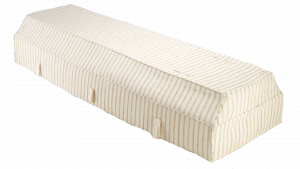
Banana Coffin
The banana, believed to have originated from the jungles of Asia, is generally mistaken for a tree, but is actually the world’s largest herb. Their main stem can reach a height of up to 8 metres, though it is not actually formed of wood, but the tightly coiled leaves of the plant. Our banana coffins are made using these dried leaves after the tree has produced its fruit and the stem is cut back each year.
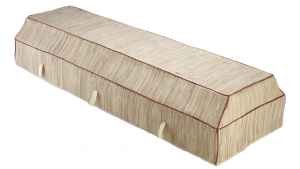
European Willow Coffin
Our European willow products are hand made to by a co-operative of cottage industries in Poland. The willow is a deciduous shrub found primarily on moist soil in cold and temperate regions of the Northern hemisphere. Almost all European willows take root very readily from cuttings or even where broken branches lie on the ground.

Fabric Coffin
These are UK Manufactured cardboard coffins covered with a decorated ‘Pall’ either Fragrant Root or Woven Banana Leaf. Both these options are hand made in fair trade facility in Indonesia. Gives a unique look and very good value.
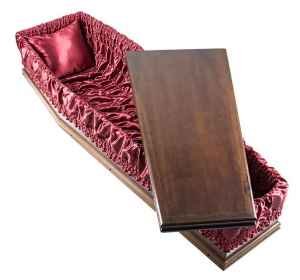
Fabric Coffin
These are UK Manufactured cardboard coffins covered with a decorated ‘Pall’ either Fragrant Root or Woven Banana Leaf. Both these options are hand made in fair trade facility in Indonesia. Gives a unique look and very good value.

Few More Variant Of Coffins We Offer
Buy a coffin with complete confidence with the Comparethecoffin.com price promise “If you find the same coffin or casket of the same quality for less we will refund the difference.”
Our pricing is completely clear with no hidden extras, VAT and delivery are included, we are usually able to deliver any coffin within 2 working days. Please contact us with any questions or for advice or
Telephone 0800 690 6513. Alternatively email any of your questions to info@comparethecoffin.com
After you receive the coffin – we will send an invoice and also ask you to complete a form providing feedback on the Service you received from ComparetheCoffin.com, the coffin itself and also feedback on the Funeral Director used (if any). It’s important to have this feedback to help others in the same position.
Don't Delay, Get In Touch With Us Today
[caldera_form id=”CF5fc7eb8d4acb1″]

